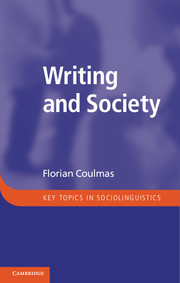Book contents
- Frontmatter
- Contents
- List of illustrations
- List of tables
- Preface
- Acknowledgements
- 1 The tyranny of writing and the dominance of vernacular speech
- 2 The past in the present and the seeds of the public sphere
- 3 Written and unwritten language
- 4 Literacy and inequality
- 5 The society of letters
- 6 Writing reform
- 7 Writing and literacy in the digitalized world
- Notes
- Bibliography
- Index
1 - The tyranny of writing and the dominance of vernacular speech
Published online by Cambridge University Press: 05 February 2013
- Frontmatter
- Contents
- List of illustrations
- List of tables
- Preface
- Acknowledgements
- 1 The tyranny of writing and the dominance of vernacular speech
- 2 The past in the present and the seeds of the public sphere
- 3 Written and unwritten language
- 4 Literacy and inequality
- 5 The society of letters
- 6 Writing reform
- 7 Writing and literacy in the digitalized world
- Notes
- Bibliography
- Index
Summary
We live in a literate world. This is true, notwithstanding the fact, that according to UNESCO statistics, there were, in 2010, some 790 million illiterate adults in the world, more than the population of the European Union. However, even in the African and Asian countries where illiterate adults are concentrated, oral culture is no longer considered a viable alternative to literate culture – a different way of life, a matter of preference that could be sustained. Life without letters is a paradise lost, if a paradise it was. In our day and age, reading and writing are indispensable for participation in society, and there is no evading the fact that literacy skills are a major determinant of one's life chances. This holds for the world at large and is even less debatable for industrialized countries. Illiteracy in these countries is a deplorable state of affairs, a social injustice that excludes a small minority from mainstream society. Language in the written mode is part of everyone's everyday communication behaviour, actively and passively and, in the case of the illiterate, confronts them with an insurmountable barrier. It is, therefore, argued nowadays that literacy is a universal human right.
Writing has been around for at least five millennia, and although universal literacy is a recent achievement in only some parts of the world, writing has exercised an influence on language for a long time. In fact, a clear distinction between writing and language has not always been made, neither in everyday discourse nor in scholarship. It is perhaps understandable, therefore, that, in order to eliminate confusion and to establish the object proper of linguistic inquiry, modern linguists have emphasized speech, relegating writing to the sidelines. Linguistics, it has been argued repeatedly, should study natural language – that is, the inborn capacity for language – and while human beings are born to speak, they are not born to write. This is the basis of the argument for the neglect of writing in linguistics. A brief review of the origin of this argument is useful in order to appreciate its merits and the influence it had on theory formation in linguistics as well as in sociolinguistics.
- Type
- Chapter
- Information
- Writing and SocietyAn Introduction, pp. 1 - 18Publisher: Cambridge University PressPrint publication year: 2013
- 1
- Cited by

